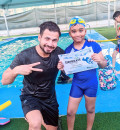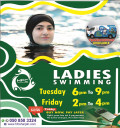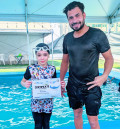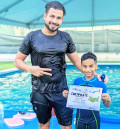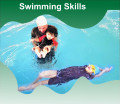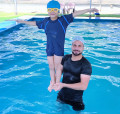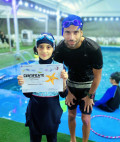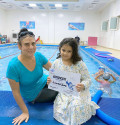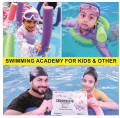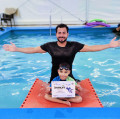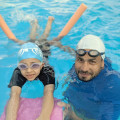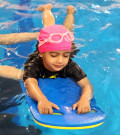
Beyond the physical aspect, swimming also has numerous psychological benefits for kids
2024-03-11 - swimmingIntroduction
In today's fast-paced world, ensuring that our children stay
physically fit is more important than ever. With the rise of sedentary
activities and screen time, finding enjoyable forms of exercise for kids is
crucial. One such activity that ticks all the boxes is swimming. Not only is it
a fun recreational activity, but it also offers a plethora of physical and
psychological benefits.
The Physical Benefits of Swimming
Swimming is a full-body workout that engages multiple muscle
groups simultaneously. It enhances cardiovascular health by improving heart and
lung function. Additionally, it helps in developing muscle strength and
endurance, making it an excellent choice for overall physical fitness. Unlike
some land-based exercises, swimming is low-impact, reducing the risk of injury
while still providing a challenging workout. Furthermore, it promotes
flexibility and coordination, essential skills for growing children.
Psychological Benefits of Swimming
Beyond the physical aspect, swimming also has numerous psychological
benefits for kids. It boosts confidence and self-esteem as children master new
skills and overcome challenges in the water. The rhythmic nature of swimming
strokes and the feel of water can have a calming effect, reducing stress and
anxiety levels. Moreover, the serene environment of a swimming pool provides an
opportunity for mental relaxation, allowing kids to unwind and recharge.
Safety Precautions for Kids
While swimming offers many benefits, safety should always be
a top priority. Children should always be supervised by trained instructors or
responsible adults while in the water. It's essential to ensure that kids wear
appropriate safety gear, such as floatation devices, especially if they're
still learning to swim. Moreover, teaching children basic water safety skills
can significantly reduce the risk of accidents and drowning incidents.
Tips for Making Swimming Fun
To keep kids engaged and motivated, it's essential to make
swimming a fun and enjoyable experience. Incorporating games and activities
into swimming sessions can make them more exciting and interactive. Creating a
positive environment with encouragement and praise can boost children's
confidence and make them eager to participate. Additionally, rewarding progress
and effort, whether with stickers, praise, or small treats, can reinforce
positive behavior and foster a love for swimming.
How to Start a Swimming Routine
Starting a swimming routine for kids involves finding
suitable facilities and setting realistic goals. It's essential to choose a
swimming pool that is safe, clean, and equipped with trained instructors.
Parents should work with instructors to establish achievable goals based on
their child's abilities and interests. Gradually increasing the intensity and
duration of swimming sessions can help children build endurance and improve
their swimming skills over time.
Addressing Common Concerns
Some children may have fears or concerns about swimming,
such as fear of water or allergic reactions to chlorine. It's crucial to
address these concerns with patience and understanding. Introducing children to
the water gradually and using positive reinforcement techniques can help
alleviate fear and build confidence. Additionally, for children with
sensitivities to chlorine, there are chlorine-free swimming options available
at certain facilities.
Incorporating Swimming into Daily Life
To reap the full benefits of swimming, it's essential to
incorporate it into children's daily lives. This can involve integrating
swimming into family outings, such as beach trips or pool parties. Joining
swimming clubs or teams can provide opportunities for social interaction and
skill development. Encouraging peer involvement can also motivate children to
stay active and engaged in swimming.
Monitoring Progress and Adjustments
As children participate in swimming activities, it's
essential to monitor their progress and make adjustments as needed. Tracking
improvements in skills and stamina can help parents and instructors gauge the
effectiveness of the swimming routine. Consulting with instructors for feedback
and guidance can provide valuable insights into areas for improvement.
Additionally, modifying routines based on individual needs can ensure that
children continue to progress and stay motivated.
The Role of Nutrition in Swimming Performance
Nutrition plays a crucial role in optimizing swimming
performance and supporting overall health. A balanced diet rich in fruits,
vegetables, lean proteins, and whole grains provides the necessary nutrients
for energy and recovery. Hydration is also essential for swimmers, as staying
hydrated helps maintain optimal performance and prevents fatigue. Before
swimming sessions, it's advisable to consume light, easily digestible meals and
snacks to fuel the body adequately.
Overcoming Challenges
Like any form of exercise, swimming comes with its
challenges. Children may experience setbacks or plateaus in their progress,
which can be frustrating. It's essential to reassure them that setbacks are a
natural part of the learning process and to encourage perseverance and
dedication. Seeking professional guidance when needed, such as from swim
coaches or pediatricians, can provide support and solutions to overcome
challenges effectively.







.jpg)




















































